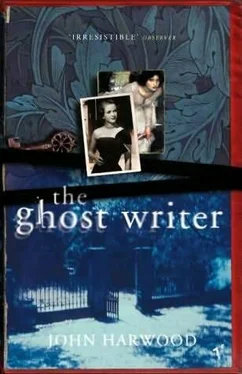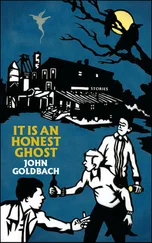My outdoor life was almost as constrained as hers, bounded by my mother's pathological dread of what would happen to me if I strayed from the narrow path that led from home to school (and post office) and back. But now that I had Alice, I no longer felt confined: gazing out of my own window, I would find myself staring through, rather than at, the rusty metal cladding of Mr Drukowicz's massive shed, to the woods and meadows of-as I would often catch myself imagining-Staplefield.
BUT OF COURSE I BEGAN TO WANT MORE, MUCH MORE: TO see Alice, to hear her voice, to hold her. I told her that I prayed every day (even though I didn't think I really believed in God) that her spine would heal or that the doctors would find a cure. 'I'm glad you do,' she replied, 'but I mustn't think about it. They told me I'll never walk again, and I've accepted that.' So I went on praying, and didn't mention it again. I would happily have spent my life savings on one short phone call, but she wouldn't allow that either. She didn't-at first-encourage any endearments or professions of love from me beyond 'Dear Alice' and 'Love, Gerard', and yet she told me, in almost every letter, that I was the closest, most important person in her life.
She did, however, keep her promise to answer honestly anything I asked about her appearance, even though she said it embarrassed her and she was very much afraid I'd think her vain. She admitted that her hair was long, and curly (she called it frizzy), and thick, and 'a sort of reddy-chestnut-brown colour', that she had very pale skin, dark brown eyes, and 'a nose that's really straight but looks as if it's just a little bit turned-up'. And though I'd been too shy to ask, she volunteered, 'just to get it over with', that her legs were quite long-and her waist quite small, 'and otherwise I suppose people would say I was quite well-developed for my age, and now I've embarrassed myself quite enough for one letter, my face is burning and I'm not saying any more'.
In other words, she looked like a goddess. A goddess who mostly wore jeans and T-shirts but sometimes, just for a change, put on one of her long dresses, 'like the one I'm wearing today, which is white and musliny and gathered at the waist, with small purple flowers embroidered over the bodice'. Apart from the obvious fact that she was stunningly beautiful, I learned, from her letters, the impossibility of capturing an individual face in words alone. My imagination of her remained both painfully vivid and tantalisingly blurred.
Then one lunch hour in the school library I found a book of paintings, mostly black and white but with a section of colour plates in the middle. They'd only just catalogued it, so the women in the pictures hadn't yet been equipped with beards, moustaches, monstrous breasts and grotesque genitals in livid Texta-Colour-you weren't allowed to borrow the art books, but that didn't save them. I turned over The Last of England and there was The Lady of Shalott, at whom I gazed, transfixed, for many minutes: this was surely Alice.
Before the afternoon bell rang I had discovered the Pre-Raphaelites, and found at least a dozen more Alices. She seemed to have modelled for the entire Brotherhood, but they weren't all equally good at painting her. Rossetti could do her hair, but he'd given her a mean mouth; Burne-Jones could do her face very well, but the hair wasn't quite right, and besides he'd painted her naked, emerging from a tree, for some reason, with her arms around an almost equally naked youth: I only dared glance at that one and pass hastily on, afraid that Mrs McKenzie the librarian would catch me. Millais's The Bridesmaid was close, but I kept turning back to The Lady of Shalott, and thinking that if only she could manage to look a little less tragic, the likeness would be perfect.
I told Alice that same night, and when at last her reply came it turned out that she already knew the picture, and yes, she supposed she did look a bit like the Lady of Shalott, except that she thought her hair was darker than the Lady's, and of course the Lady was much better-looking; whereas I felt certain the comparison was quite the other way round. I invested most of my savings in a book of Waterhouse's pictures, which I managed to smuggle home after one of our rare trips to Mawson Central Shopping Mall. Sex was not merely a taboo subject in our house; we had always lived according to the pretence-made possible by the absence of television and magazines-that no such thing existed. And even though Waterhouse's naked nymphs were Art, I knew my mother would not see them that way, any more than I did.
AND THEN I HAD THE DREAM. IT WAS LATE SUMMER, TWO years since we'd started writing. I woke-or so I thought-in bed in my own room, everything the same except that a full moon was shining through my window. A strange moon, because its light was soft and golden, like candlelight, and warm against my face. An impossible moon, because my window faced south and the sky was blotted out by the side of Mr Drukowicz's shed, but in the dream it seemed absolutely right and natural. I lay there for a little while, feeling the warmth of its rays, until I became aware that the source of the warmth, which was now filling my whole body, was much closer than the moon.
I turned my head on the pillow. Alice lay facing me, smiling the most enchanting smile, a smile of pure joy and tenderness and love. Her head was only a few inches from mine, her red-gold-chestnut hair rippling over the pillow in the candle-moonlight, our bodies not quite touching, and for a small eternity I just lay there, floating in perfect bliss. She did not look exactly like the Lady, or any of the women in the paintings; she was simply Alice, and beautiful, and the warmth of her body flowed into mine as our lips brushed and met and I woke in my wet pyjamas, alone, to the familiar patch of neon from the streetlight spilling across the wall of Mr Drukowicz's shed. It was 1.30 in the morning.
Always before, scrubbing at my pyjamas and sheets by torchlight, I'd felt nothing but shame and dread that this time-for the stains were always horribly visible in the morning-my mother would say something. But that night I went through the routine almost absent-mindedly, praying that I would float straight back into the dream, and Alice radiant beside me.
Instead I lay sleepless for a long time, struggling in vain to recapture her face as I had seen it, the glow fading until there were only the faces from the paintings left, and I buried my own face in my pillow and wept.
As I was finally drifting in and out of sleep, I had another dream, of myself as a very small child, being read to on my mothers knee, in lamplight on our couch at night. My mother was in her dressing-gown, which made it feel very late, and she was reading from a book with no pictures, a story I didn't understand at all, but I sat listening intently just the same, following the cadences of her voice. I was watching from outside, as if my older self were sitting invisibly on the couch beside them. Then I saw that my mother was crying silently as she read. Tears were streaming down her face and splashing over my pale blue sleeping suit, but she made no attempt to wipe them away; she just went on reading and the tears went on falling until I woke again briefly to find my own pillow still damp from the tears I had shed for Alice.
ON THE SATURDAY MORNING AFTER THE DREAM, I FOUND myself alone in the house. My father was at a train men's swap meet on the other side of town; my mother had run herself late for the hairdresser. I came out into the hall when I heard the front door slam, and saw that she had-most unusually-left the door to her room open. As I moved closer my gaze fell upon the drawer I had opened on that stifling January afternoon.
My unspoken pact with my mother had kept me away from her room before this. I won't pry into your secrets if you don't pry into mine. But the door was open, and Alice was so fascinated by Staplefield, and Viola, and anything I could remember about the photograph I had found.
Читать дальше












